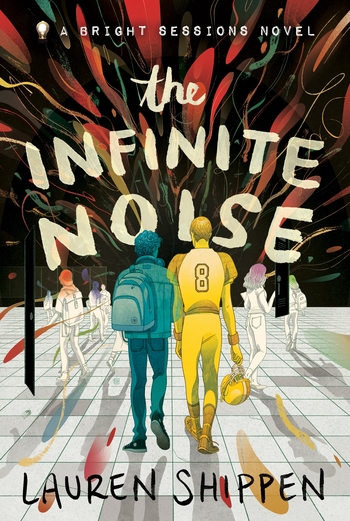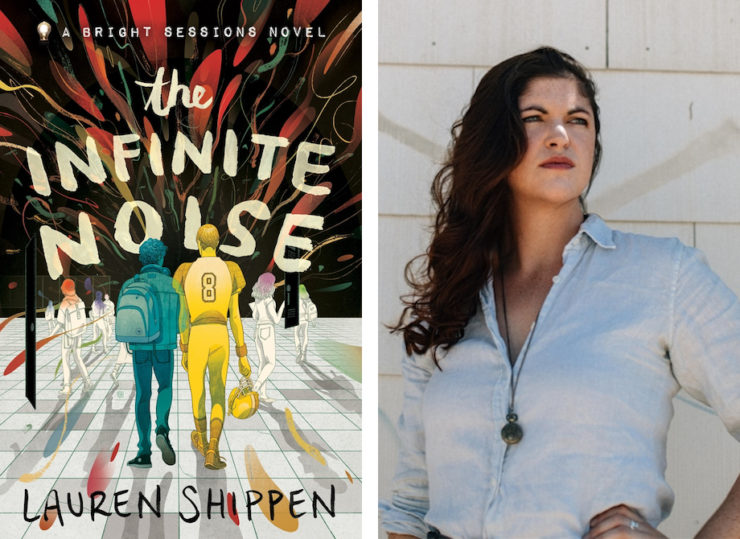As podcasts and especially audio fiction grow in popularity, the medium has seen a crossover from listening to reading: Welcome to Night Vale, The Adventure Zone, Alice Isn’t Dead, and Steal the Stars have all been adapted from fiction podcasts to books that expand the worlds between your headphones into engage your imagination in new ways. With The Infinite Noise, Lauren Shippen, creator of The Bright Sessions and The AM Archives, takes TBS’ most beloved love story—between superpowered empath Caleb and Adam, who “keeps him green”—and builds it out into a poignant story about the challenges of connecting with someone.
Shippen, who also wrote Stitcher’s forthcoming audio drama Marvels, talks the tricky shifts from writing dialogue-only scripts to prose novels, plus headcanons and finding strength in vulnerability.
If you were describing The Infinite Noise to someone who has never listened to The Bright Sessions, how would you do so?
I’d start with the basics: The Infinite Noise tells the story of two high school boys who never seem to fit with the world around them but find that they fit with each other. Adam—biracial, gay, and struggling with depression—feels like he can never connect; Caleb feels… well, he feels everything. He’s Atypical—someone with supernatural abilities—and his special power is Empathy. Caleb feels the emotions of everyone around him as if they’re his own. As he starts to understand his ability through therapy with the mysterious Dr. Bright, Caleb discovers that being Atypical is more complicated than he could have ever thought; and so is falling in love.
From there, I’d talk about how both the book and The Bright Sessions are character-focused, empathy-driven, and LGBTQ+ friendly. If you’re looking for a book that has a warm-hearted romance with a tinge of supernatural danger, this might be the book for you!
You’ve said that Welcome to Night Vale was an early inspiration for The Bright Sessions. When adapting the audio drama to book form, did you similarly look to the Night Vale novels, or elsewhere, for guidance?
I’ve read—and thoroughly enjoyed—the Welcome to Night Vale novels. They are such a beautiful expansion of the universe of the podcast and as winningly written as everything that Jeffrey [Cranor] and Joseph [Fink] do. But I’d read them as a fan, not as someone looking for influence or inspiration. Even though both are podcast-to-book adaptations, WTNV is such a different world from TBS and the books were accomplishing very different things I think. I definitely looked to other YA authors for inspiration—Jandy Nelson, Rainbow Rowell, Britta Lundin—but, at the end of the day, writing a novel for the first time is something everyone has to figure out on their own.
Buy the Book


The Infinite Noise
The character of Caleb Michaels is a fascinating example of someone who grapples with the culture of toxic masculinity while retaining his sensitivity and vulnerability. What first inspired you to create this character of a teenage football player who is also an empath, i.e., someone so overwhelmed with others’ feelings that he has difficulty identifying his own? What do you want readers to take away from Caleb’s emotional journey?
I’ve always been fascinated by ideas of masculinity and toxic masculinity and explore those themes in a lot of my characters and stories. But Caleb was definitely the first that allowed me to dive into that. I think I was initially really intrigued by the idea of these sharp contrasts in characters—giving someone a classic superpower and then thinking about the person least equipped or suited to that ability. The football jock character is one so far from my own identity and high school experience that it seemed like it’d be fun to write, and it seemed extra fun to then give him an ability that he would least like to have. That was his initial conception and then actually writing the character and working with [voice actor] Briggon Snow developed him into something much richer and deeper than his sketched-out character concept. If there’s any one thing I’d want someone to take away from Caleb’s emotional journey, it’s that being vulnerable does not make you weak. There is great strength and power in being emotionally vulnerable and sensitive.
In writing Caleb/Adam, were you inspired by particular high school/YA romances, or were you trying to write something you weren’t seeing in the genre?
There wasn’t a specific YA romance, but certainly those authors I mentioned before have written beautiful stories that have stayed with me. Anyone who knows me knows how much I love rom-coms and love stories, but I didn’t approach this story in the classic “getting together story” sense. I wanted it to be less about how two people get together and more about how two people are together. Being in love is beautiful and difficult and, even though a lot of the story is about the two of them moving towards something, it is always focused on the challenges and joys of connecting with someone.
What kinds of adjustments did you have to make to your writing style in going from audio drama, where characters articulate their inner thoughts aloud, to actually depicting that inner monologue in prose?
It was definitely a big shift—writing prose felt a lot trickier than writing dialogue. But keeping the story in first-person POV helped a lot. I was still able to ground the story in the kind of emotional character writing that I’m comfortable with. But beyond that, it was still an adjustment—I had to focus more on the sensory experience of the characters, instead of just the emotional ones.
How was it writing Adam’s inner monologue, especially his depressive episodes?
Those sections of the book were actually some of the easiest to write, in the sense that I didn’t have to think very much about how to frame things or express what I was trying to express. That’s not to say I wasn’t thoughtful about representing his depression; it simply flowed naturally. It’s something I’ve struggled with myself so—unlike the ability to feel other people’s emotions—I was able to draw on my own experience to write a lot of Adam’s inner life.
One striking detail in the text is that you don’t describe any of the characters (a feature in audio dramas as well). Was that a deliberate choice?
It was a deliberate choice in the audio drama, mostly because, without narration, describing what people look like can be really clunky—people don’t typically tell each other what they look like. And, as someone who loves to imagine my own vision of what characters look like (and see representations of others’ imaginations!), I’m always trying to find the balance in prose of giving some starting point but allowing for plenty of interpretation. There are certainly more descriptions of characters in the book than the podcast but, as a writer, describing appearances is something I’m still growing in. Especially when writing characters for which people have established headcanons, I never want to discourage those individual ideas but I used the book to start to describe how I’ve always imagined the characters. Caleb is taller than Adam, with green eyes; Adam, who’s biracial, has curly hair, freckles, and darker skin. But even with those basics, I still want to leave room for readers—and existing fans of the podcast—to imagine exactly what they want to imagine.
Are there any Easter eggs for The Bright Sessions listeners that you were excited to include?
Definitely! There are some scenes directly from the podcast that listeners will recognize, but there are also a few new scenes with secondary characters—like Frank, Chloe, or Adam’s aunt—that hopefully provide new sides to those characters. There’s also a blink-and-you-miss-it reference to Mark in there.
Any hints about the next two Bright Sessions novels, about Damien and Rose?
I actually recently finished my first draft of the Damien novel and I will say that it is very different from The Infinite Noise. Maybe unsurprisingly given the lead, it’s a lot darker—certainly not a love story. Because it takes place in 2007—ten years before the main events of The Bright Sessions—Damien is the only character from the podcast that appears in the book. But there are a whole bunch of new characters that I fell in love with writing that I can’t wait for everyone to meet.
The Infinite Noise is available September 24 from Tor Teen.
Read an excerpt on Tor.com.
Natalie Zutter is a playwright and aspiring audio dramatist; you can listen to her Black Mirror-esque one-shot “Proxies” or her standalone true crime riff “Not Your (Final) Girl.” Share your favorite fiction podcasts with her on Twitter!










